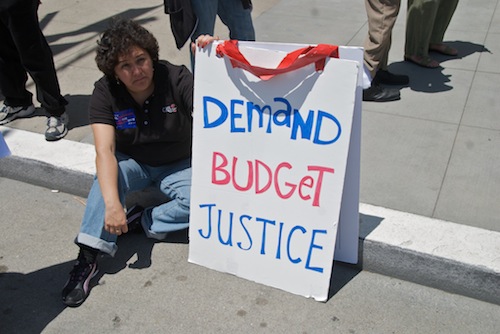The budget plan released by the House Budget Committee March 17 makes infrastructure investment, health care and the nation’s most vulnerable citizens victims while rewarding corporations and the wealthy.
Political observers say the budget proposal is unlikely to pass the Senate in its current form and would be certain to be vetoed by President Obama. But they say it is a telling benchmark for the priorities of Republicans leading the legislative branch.
While the spending plan purports to cut the federal deficit, economists who support unions and working families say the budget actually would increase the deficit and makes it even harder for cash-strapped states to care for children and others on Medicaid or food stamps.
Jared Bernstein, former chief economist to Vice President Biden, in an article in the Washington Post says:
The policies put forth in this document [budget] suggest that America’s main problem is that the poor have too much and the wealthy, too little. The budget plan ‘corrects’ this perceived imbalance by deeply cutting programs that help low-and middle-income people, and cutting taxes on those with high incomes …
 |
| Photo used under a Creative Commons license from Flickr user Steve Rhodes. |
The budget’s sponsors propose spending cuts on Social Security, Medicare and the Affordable Care Act, a measure most of them want to repeal. But they don’t discuss the impact on the budget and the economy if millions of Americans are thrown out of the medical insurance market.
Republicans answer critics by repeating claims made over the years that their policies will result in wealth “trickling down” to working Americans, increasing their spending power and prosperity. They support the claim that the budget will be balanced in 10 years using a device called dynamic scoring, a highly speculative method of estimating growth. Friends of labor in Congress say it’s an accounting trick.
Currently, the costs of providing Medicaid and food stamps are shared between the federal government and the states. The budget proposal calls for the government to provide block grants to the states. Then, if costs go up, rather than the federal government helping, states would be left on their own. Republican lawmakers claim this will save the federal government $913 billion. They don’t say what services will be cut to some of the nation’s most vulnerable adults and children.
Nobel Prize-winning economist Paul Krugman, in a New York Times article entitled, “Trilion Dollar Fraudsters,” says of the budget proposals, “It’s very important to realize that this isn’t normal political behavior. The George W. Bush administration was no slouch when it came to deceptive presentation of tax plans, but it was never this blatant.”
Richard Fiesta, executive director of the Alliance for Retired Americans says:
The budget plan put forward by House Republicans today is a frontal assault on the needs of seniors, persons with disabilities and working Americans. It also signals that the Republican leadership is interested in going after Social Security, which keeps 22 million older Americans out of poverty. We’ve seen these tactics before—Commissions to recommend so-called reforms and attempts to pit disabled workers against retired workers.
As the budget fight intensifies, some Democrats, led by Rep. John Larson (D-Conn.), are introducing a bill in Congress that would expand benefits under Social Security and help fund the plan in the future. Retirees and disabled workers would get larger cost-of-living increases. Funds would come from lifting the earnings cap on Social Security taxes for individuals who make more than $400,000 per year.
“While Americans cherish the vital benefits of Social Security, there are still those who don't believe it's going to be there for them.” Under his bill, he says, “The benefits are not only going to be here, but they will be enhanced.”
Says International President Edwin D. Hill:
It is unconscionable for some leaders in Congress to propose cutting America’s investment in our children, our veterans and retirees, the unemployed and the disabled, while reducing taxes on our wealthiest citizens and corporations. Trickle down economics is an empty promise. Thousands of our members are sick and tired of smoke and mirrors and seeing Americans pitted against one another, whether that happens at the bargaining table or on the floor of Congress. It’s time to make our voices heard.